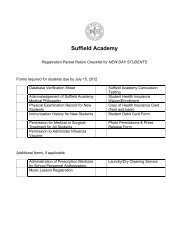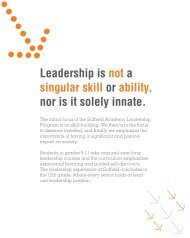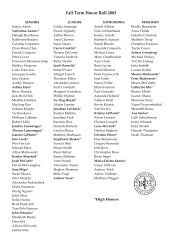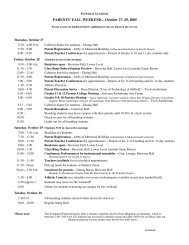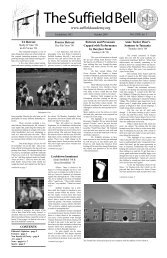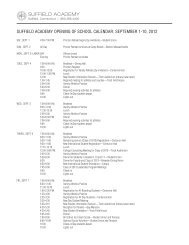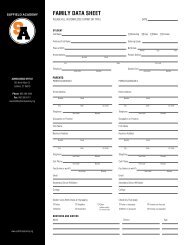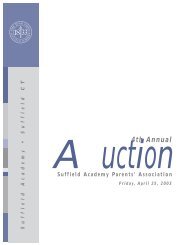here - Suffield Academy
here - Suffield Academy
here - Suffield Academy
You also want an ePaper? Increase the reach of your titles
YUMPU automatically turns print PDFs into web optimized ePapers that Google loves.
8 - The Bell October 2005<br />
Sports Psychology<br />
Sarah Ellerton ’06 and Meara McCarthy ’07<br />
Sports<br />
Sports psychology is a relatively<br />
new concept in sports medicine. It involves<br />
using the brain to control bodily actions<br />
in order to perform at a higher level. The<br />
addition of the Vasilenkos to the community<br />
has brought am introduction to this subject.<br />
All of the nerves and muscles are<br />
linked to a control center, the brain. By using<br />
their brain to force their body to perform in the<br />
way that they need it to, athletes can increase<br />
their level of play, sometimes dramatically.<br />
Three fundamental pieces to sports<br />
psychology are goal setting, imagery, and<br />
simulation. By setting goals an athlete is<br />
able to plan out the way he or she would<br />
like to perform. Goals help athletes keep<br />
in mind what they are trying to achieve;<br />
t<strong>here</strong>fore, it is much easier for them to use<br />
their minds to reach their goal. Imagery and<br />
simulation allow athletes to practice over and<br />
over again their event in their minds. When<br />
it is finally time for athletes to perform, they<br />
have already practiced this event hundreds<br />
of times, which allows for them to feel<br />
more comfortable and know everything<br />
about the event. They also simulated perfect<br />
performance, so when the athlete eventually<br />
competes, the mind is so used to having<br />
a perfect outcome that body replies by<br />
producing a close to perfect performance.<br />
Yelena Vasilenko, the newest<br />
addition to <strong>Suffield</strong> <strong>Academy</strong>’s math<br />
department, has a close to fifteen year<br />
background with sports psychology.<br />
According to Mrs. Vasilenko, sports<br />
psychology is “the ability to control your<br />
mind through self-hypnosis.” She worked<br />
with her husband in Russia, her birthplace,<br />
with various sports teams. Mrs. Vasilenko<br />
developed an interest in the subject of sports<br />
psychology because it was not something in<br />
the mainstream, and she liked the idea that<br />
it was medical diagnosis with mentality.<br />
She and her husband worked with martial<br />
artists, ice skaters, gymnasts, and fencers.<br />
Unlike coaches who simply yell at their<br />
players Mrs. Vasilenko described her job as,<br />
“explaining reasons and philosophy for the<br />
sport in order to teach self-hypnosis.” The<br />
Vasilenkos were able to produce significant<br />
results with their self-hypnosis technique.<br />
Mr. Vasilenko is still working in<br />
the field of sports psychology, w<strong>here</strong>as Mrs.<br />
Vasilenko stopped when they emigrated.<br />
Mr. Vasilenko works in Simsbury with<br />
Olympic ice skaters. When the team first<br />
heard about the idea of sports psychology,<br />
they brushed it off as unreliable and<br />
useless. But when the coaches heard the<br />
results that Mr. Vasilenko had with other<br />
teams, Mrs. Vasilenko said, “he got a phone<br />
call the next day, asking him to help.”<br />
For sports like ice skating<br />
and martial arts minor injuries are so<br />
frequent that the main focus of the selfhypnosis<br />
that the Vasilenkos promoted was<br />
lowering the pain barrier, which would<br />
theoretically make athletes more resistant<br />
to pain. Over time with different teams,<br />
coaches, and athletes, the Vasilenkos<br />
have seen very strong results, proving<br />
that their self-hypnosis training works.<br />
So how can this relate to your<br />
life, as a high school student athlete? As<br />
Mrs. Vasilenko said, “Sports psychology<br />
is studying how you react in a stressful<br />
situation. It can relate to sports,<br />
school, dealing with your boyfriend.”<br />
continued from page 7<br />
though some days do not end until 3:20 pm!)<br />
A bigger issue, however, is<br />
one concerning the schedule’s affect on<br />
after school commitments. Getting done<br />
with classes later also means getting to<br />
practices later, while still having to be at<br />
formal dinner at or club meetings. It may<br />
be a concern among coaches and athletes<br />
that loss of practice time will cause teams<br />
to suffer. Another very visible change is<br />
the conference period before, rather than<br />
after lunch. This was created mostly by<br />
the request of the dining hall, whose staff<br />
members and work program workers<br />
need the extra time to prepare for lunch.<br />
Yet, even with these nuisances<br />
resulting from the schedule, such a test<br />
run as this could not have come at a more<br />
convenient time. With multiple Saturdays set<br />
aside for testing, and others that would also<br />
cause disruptions to our regular schedule,<br />
trying something new was a win-win<br />
situation. This way, special schedules can be<br />
avoided, and a new schedule that works well<br />
for our school may become an end result.<br />
While it is still unclear how this<br />
fall’s schedule will fare, Mr. Ellerton says<br />
that all members of <strong>Suffield</strong> <strong>Academy</strong> “can<br />
expect to be surveyed in some way at the end<br />
of this trial, at which point the information<br />
will be analyzed and taken into consideration<br />
for future years.” So, what will your opinion<br />
be? Is an extra day of relaxation worth the<br />
tight five day B week? Or do you think<br />
our previous schedule was more effective?<br />
Ned Booth ’06<br />
photo Navid Obahi ’06<br />
Jill Furman ’06<br />
photo Cole Archambault ’06<br />
Ji Won Shu ’06<br />
photo Brooke Beatt ’06



![SL]FFIELD ACADEMY - Suffield Academy](https://img.yumpu.com/26885206/1/190x245/slffield-academy-suffield-academy.jpg?quality=85)
